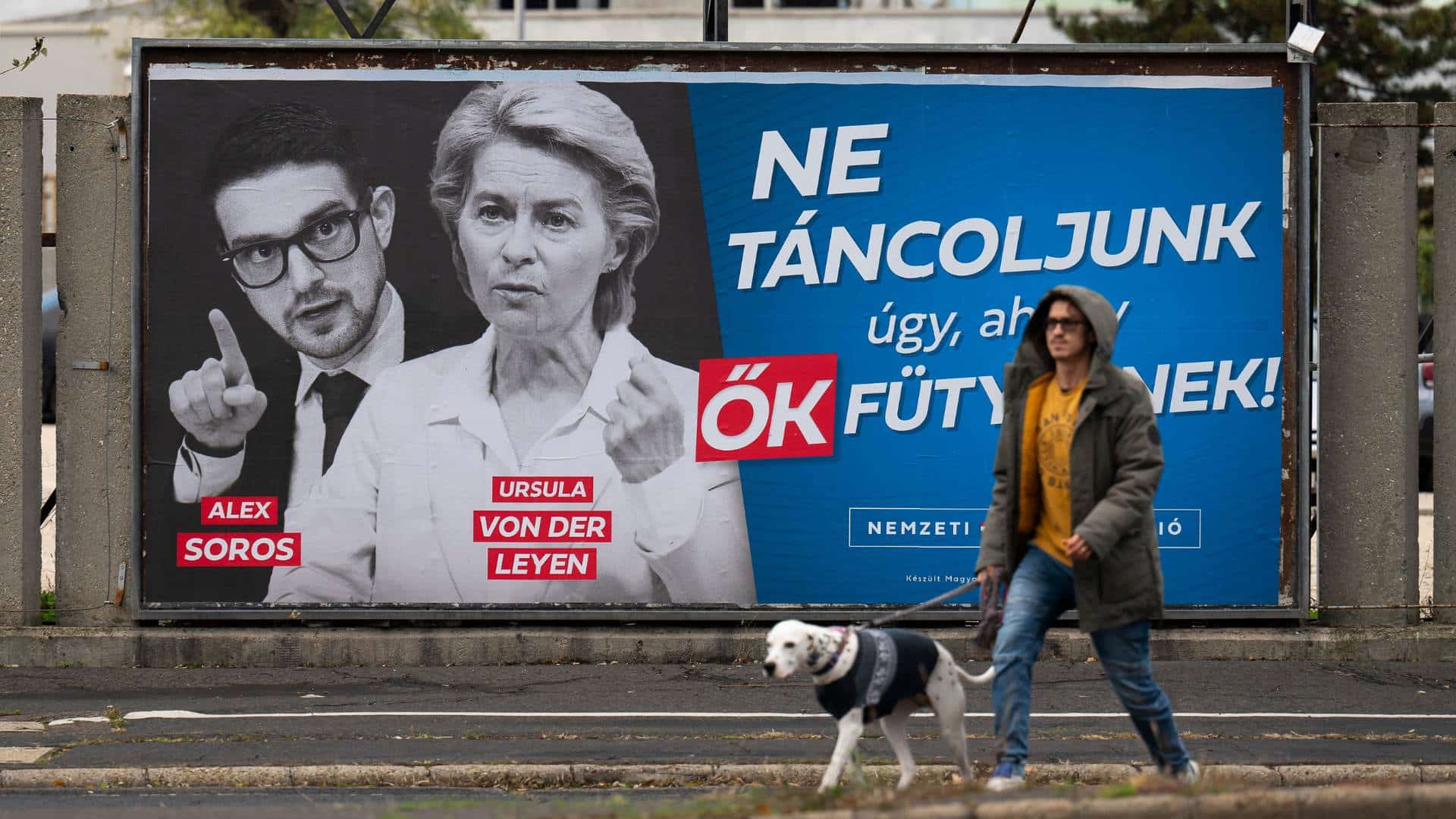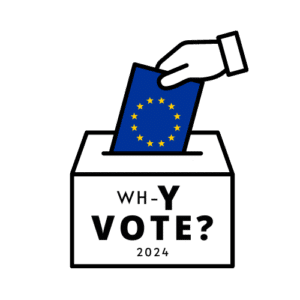Hungary’s current government distances itself from the European Union. But young people share a different mindset.

A government billboard reading “Let’s not dance to their tune” is seen with portraits of Open Society Foundation Chair Alex Soros and European Commission President Ursula von der Leyen in downtown Budapest, Hungary, 20 November 2023. A countrywide billboard campaign flooded the streets of Hungary in an election campaign that marked an escalation of tensions between the country’s right-wing government and the European Union. (AP Photo/Denes Erdos)
Editor’s Note: This story, by News Decoder Correspondent Helen Womack, is the fourth article in our five-part Wh-Y Vote series that focuses on youth participation in the upcoming European elections.
Between 6 and 9 June, voters in all 27 countries of the European Union will go to polls to select representatives of the 700+-member European Parliament, the only directly-elected transnational assembly in the world.
The last European election, in 2019, saw the first increase in voter turnout in 40 years. The leap to just over 50% was largely thanks to a so-called ‘youth surge’: namely a 12% increase in turnout among 25 to 39-year olds and a 14% increase among the under 25s.
Senior EU figures heralded the result as a new era of civic engagement and evidence of strengthened support for the European Union. Yet, even with the increase, only half of eligible voters cast a ballot and turnout actually decreased in eight countries.
The 2024 election will include, for the first time, 16-year olds in Germany and Belgium, joining their Maltese and Austrian counterparts who were granted the vote in the 2000s.
News Decoder’s Wh-Y Vote series aims to shed light on these questions by examining how young people across the European Union feel about the upcoming election. What influence do they believe the union has on their lives? Why are young people voting or not voting? What are the issues driving them to or away from the polling station?
Correspondents based in France, Denmark, Hungary, Latvia and Poland have sought the views of young voters and non-voters as well as election experts in their respective countries and, over the course of five articles, will paint a nuanced and candid portrait of the state of the youth vote in the run up to polling day.
At a recent talk I gave about Russia, Hungarian students at Budapest’s Eötvös Loránd University (ELTE) saw some parallels with their own country.
True, freedom is not as restricted here as under Vladimir Putin but Hungary too has a seemingly immovable leader and ruling party, and the often fractious opposition struggles to break through.
But if anyone can give Prime Minister Viktor Orbán and his Fidesz party an electoral wake up call, it is perhaps the nation’s metropolitan youth; Generation Z, a whole different generation from those who emerged from Communism into the free market in the 1990s.
And soon they will have a chance, as Hungarians go to the polls in the EU parliamentary elections on 9 June 2024. These elections will not change Hungary’s proudly “illiberal” government but they will be a test of whether voters are tiring of populism and seeing a need for more liberal democracy.
Hungary joined the European Union in 2004. Orbán, in power since 2010, has often been at odds with Brussels. Presenting himself as the defender of Hungarian sovereignty and traditional Christian family values, he has defied the European Union over media freedom, the rule of law, migration and LGBTQ rights. Despite the war in Ukraine, he has maintained links with Moscow and shown open sympathy for former U.S. President Donald Trump.
“This European election is a symbolic occasion, as it’s the first where we have Hungarian voters who were born inside the EU,” said Márton Schlanger, a researcher at the independent Republikon Institute.
Will people vote?
Turnout could be low.
“The formative political experience of Hungarian youth is that the current ruling party is unbeatable and voting is a futile effort,” he said.
One of the students in the group I was addressing said that she and her generation wants change. For her, the problem was the older generation. “Our grandparents, and people in the villages who don’t speak English, see nothing but Fidesz propaganda on television,” she said.
Hungary, a country of nearly 10 million, will send 21 members to the 720-seat European Parliament. Parties put up lists of candidates and get seats based on their share of votes.
In Europe, members of the European Parliament, known as MEPs, sit in ideological groups. Previously, Fidesz was with the centre-right group but now it sits apart. MEPs from Hungary’s 12 opposition parties will find like-minded colleagues among the socialists, liberals or greens.
Campaigning on war and peace
There is concern in the EU about Russian fake news, aimed at getting pro-Russian MEPs elected. In Hungary, the Fidesz line is that a vote for the ruling party is a vote for “peace” in Ukraine while opposition politicians who call out Putin’s aggression are “war mongers”.
Hungary is one thing but Budapest is another. The capital city is a liberal island in the more conservative sea of the country as a whole. Deputy Mayor Kata Tüttő, who tops the Socialist Party’s candidate list, told reporters her focus was on climate change, affordable housing, health and education. She added that while democracy might be slipping nationally, strong links between cities such as Budapest and Vienna helped to keep it alive.
As the election approaches, a billboard battle is raging on the streets of Budapest.
“Let’s not dance to their tune,” says one government billboard attacking Brussels. Another shows European Commission President Ursula Von der Leyen sitting on a red velvet throne, while Hungarian opposition politicians dressed as waiters carry silver platters with a menu of “migration”, “gender” and “war”.
But a recent scandal, which forced Hungary’s president and justice minister to resign over an ill-judged pardon to a convicted paedophile, played into the hands of the opposition. “God, Homeland and Paedophilia”, said one opposition billboard sarcastically.
An opposition emerges
Protesters came out onto the streets and a strong political newcomer emerged who knows all about corruption because he was once close to the government. Péter Magyar, whose Tisza (Respect and Freedom) Party is fielding 12 Euro candidates, has been taking the battle against Fidesz outside Budapest to smaller towns and rural areas.
Opinion polls put Fidesz ahead with 45% of the vote and Tisza in second place with 25%. Schlanger, from Republikon Institute, said Tisza seemed to have “struck a chord” with young voters while Momentum was another “go-to choice” for young liberals. But he noted the extreme right-wing party Mi Hazánk (Our Country) also had a young voter base.
So what do young Hungarians make of all of this? Of course, it’s not a simple matter of young people supporting the opposition while the older generation backs Orbán. Sometimes older people are opposition-minded while the young support Fidesz.
“A lot of people criticise Orbán but as I see it, there isn’t any competent alternative,” said Bálint, an economics student. “If Orbán’s bad, the opposition are worse. That’s it, basically.”
Amid widespread apathy, it is likely that many young Hungarians will not vote at all. But the politics class at ELTE can hardly ignore politics.
“I’m absolutely going to vote,” said Balázs, a student of international relations. “I believe it’s my duty to go out and attempt to shape the future of my country. I will do some research into the candidates before placing my vote but I would opt for a more EU-friendly opposition candidate.”
Fanni, who hopes to be a journalist, supports the satirical Two-Tailed Dog Party.
“I see it as the best option to show we are tired of old politicians and do not want to have to choose between Gyurcsány [Ferenc, a socialist politician from earlier times] and Orbán,” she said. “That’s too much like the choice between Biden and Trump.”
And even though the European elections will not change the domestic situation, Fanni sees meaning in sending opposition politicians to Europe. “It’s important to show how different Hungarians are; that we don’t all automatically agree with Orbán,” she said.
Three questions to consider:
- In what way are the EU elections in Hungary different than in other member states?
- How do the views of youth voters in Hungary differ from those of older generations?
- In what ways are national autonomy or international alliances relevant to an individual citizen?

Helen Womack is a specialist on former Communist countries. From 1985 to 2015, she reported from Moscow for Reuters, The Independent, The Times and the Fairfax newspapers of Australia. Since the refugee crisis of 2015, she has written for the United Nations Refugee Agency, UNHCR, about how refugees are settling in Europe. After column writing, Womack went on to write a book about her experiences in Russia: “The Ice Walk — Surviving the Soviet Break-Up and the New Russia.”
Wh-Y Vote 2024 is funded by the European Union. Views and opinions expressed are however those of the author only and do not necessarily reflect those of the European Union or the Directorate General for Communications Networks, Content and Technology. Neither the European Union nor the granting authority can be held responsible for them.


